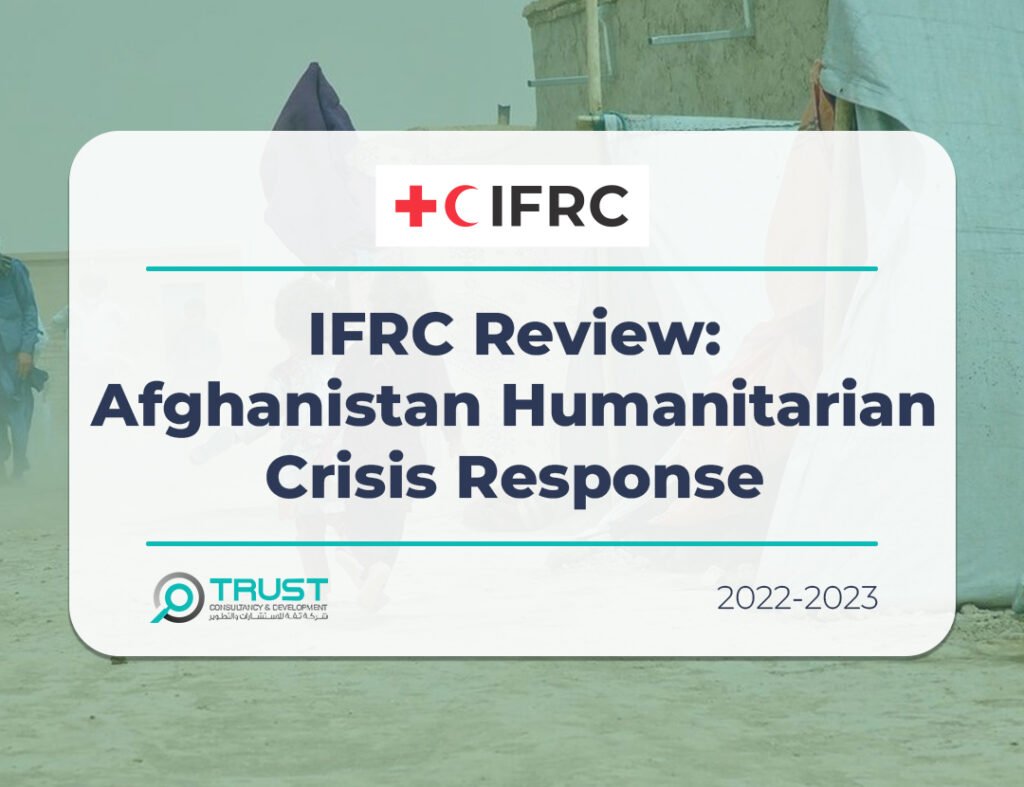About the Project
Amid Afghanistan’s ongoing humanitarian crisis, intensified by conflict, natural disasters, and recent political upheaval, the Afghan Red Crescent Society (ARCS) and the International Federation of Red Cross and Red Crescent Societies (IFRC) have launched critical response operations. These efforts focus on delivering essential aid—including food, cash assistance, winter kits, and hygiene supplies—to regions affected by drought, floods, and earthquakes.
Within this project, Trust Consultancy was tasked with conducting third-party monitoring and evaluation to assess the effectiveness, relevance, and sustainability of the humanitarian response. Using the OECD DAC criteria—an internationally recognized framework for evaluating aid effectiveness—Trust gathered data from affected communities, facilitated key informant interviews, and analyzed the impact of the interventions. This evaluation identified key areas for improvement, ensuring that insights from this response can enhance future emergency operations.
Methodology
The mid-term review utilized a mixed-methods approach to capture both quantitative and qualitative data across a diverse set of respondents. The evaluation was conducted in five regions—Badghis, Kabul, Kandahar, Nuristan, and Takhar—chosen to represent various intervention types and geographic diversity.
- Quantitative Survey: A structured survey was administered to 633 participants, including both aid recipients and non-recipients, to gather measurable data on satisfaction, relevance, and timeliness of the provided aid. This survey allowed for statistical analysis to identify trends and areas of need.
- Qualitative Interviews and Focus Groups: The evaluation team conducted 86 key informant interviews (KIIs) and 27 focus group discussions (FGDs) with beneficiaries, community leaders, ARCS volunteers, and local authorities. These discussions provided deeper insights into personal experiences, perceived effectiveness, and contextual challenges surrounding aid delivery.
- Stakeholder Engagement: Involving multiple stakeholders, the evaluation team gathered diverse perspectives, helping to understand both the immediate and longer-term impacts of the aid. This engagement also allowed ARCS and IFRC to assess the community’s expectations and adapt strategies to local needs.
This comprehensive methodology enabled the review team to assess the program’s relevance, efficiency, and sustainability from both a broad and personal perspective, ensuring that findings reflect on-the-ground realities and align with strategic improvement goals
Main Findings
Relevance and Appropriateness: Overall, aid recipients found the assistance relevant to their immediate needs, especially in the case of food and cash assistance. However, many recipients noted that these resources were not always sufficient in quantity. Some materials, such as winter and household kits, were seen as less relevant in certain areas due to timing and specific needs.
Efficiency and Effectiveness: Coordination between ARCS, IFRC, and other humanitarian partners was generally successful, though significant logistical challenges affected distribution timelines. Damaged infrastructure, limited transport options, and shortages in volunteers delayed some aid distributions. Additionally, limited internet connectivity in remote areas complicated data reporting and communication efforts.
Sustainability and Connectedness: To ensure sustainable impacts, a stronger emphasis on coordination with national authorities and local humanitarian partners is needed. Increasing ARCS’s involvement in proposal development, bolstering digital infrastructure, and enhancing internal systems are essential steps toward greater resilience and local capacity.
Suggested Improvements: Enhancing third-party monitoring, increasing gender balance within ARCS teams, and refining procurement systems emerged as critical action points. Additionally, a focus on digital transformation, longer-term assistance models, and resilience-building initiatives would strengthen the overall impact and reduce dependency on emergency aid.
Conclusion
The mid-term review of the IFRC and ARCS’s response to Afghanistan’s humanitarian crisis illustrates a dedicated effort to meet urgent needs in the face of complex challenges. While immediate assistance—including food, cash, and hygiene kits—has been crucial for survival and stability, the review highlights opportunities to further strengthen the impact and sustainability of future aid.
By prioritizing local capacity-building, enhancing digital infrastructure, and investing in resilience-building, IFRC and ARCS can not only improve short-term outcomes but also empower Afghan communities to withstand future crises. Trust Consultancy’s evaluation underscores the importance of ongoing adaptation and collaboration with national stakeholders, ensuring that relief efforts continue to be both relevant and resilient. Moving forward, these insights can guide IFRC, ARCS, and partners in refining their strategies to build a more sustainable foundation for humanitarian support in Afghanistan.


